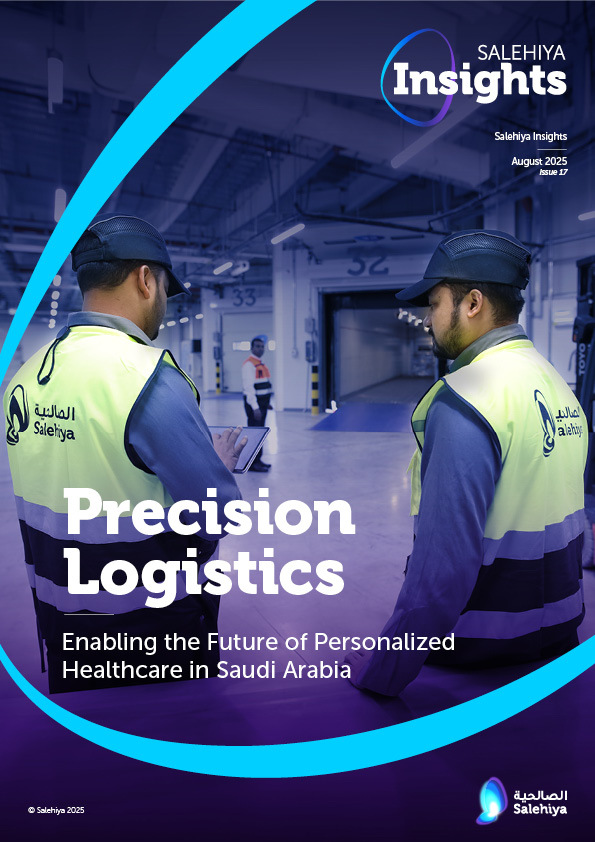Precision Logistics: Enabling the Future of Personalized Healthcare in Saudi Arabia
WC: 1,452
Personalized medicine represents a transformative shift in healthcare delivery by moving from one-size-fits-all treatments to tailored interventions based on individual genetic, environmental, and lifestyle factors. Saudi Arabia’s Vision 2030 healthcare transformation is positioning the Kingdom as a global leader in this paradigm shift, with precision logistics serving as the critical infrastructure enabling personalized medicine at scale.
The integration of advanced logistics systems with genomic medicine capabilities is creating unprecedented opportunities for healthcare optimization. Saudi Arabia’s cold chain pharmaceutical logistics market reached USD$131 million in 2024 and is projected to grow at 9.20% CAGR through 2033, while the Kingdom’s genomics market was valued at USD$555 million in 2023 and is projected to reach USD$1,768 million by 2030 with an 18% CAGR.
In 2024, the government committed USD$57 billion to health and social development, reflecting strategic investment in precision healthcare infrastructure that leverages genomic data, AI-powered predictive analytics, and advanced supply chain technologies.
Genomic-Driven Supply Chain Transformation
Delivering personalized medicine at scale demands a reimagined logistics system. Saudi Arabia is investing in infrastructure, regulation, and public-private partnerships to support individualized care.
Precision medicine introduces complex logistics demands, particularly for genomic testing and biologics that require strict temperature control. Whole genome sequencing ranges from USD$500 to $1,000 per sample, while targeted panels cost between USD$200 and $500. These materials must be transported under ultra-cold conditions to maintain sample integrity. With over 85% of biologics requiring specialized cold storage, advanced temperature monitoring systems—using IoT sensors and real-time tracking—are essential for managing gene and cell therapies across the supply chain.Individualized drug handling becomes even more critical when viewed through the lens of patient safety. Type B adverse drug reactions, which affect genetically susceptible individuals, account for approximately 20% of all adverse reactions. Pharmacogenomic strategies can significantly reduce these risks by tailoring medication to an individual’s genetic profile, but this
https://www.imarcgroup.com/saudi-arabia-cold-chain-pharmaceutical-logistics-market
https://www.insights10.com/report/saudi-arabia-genomics-market-analysis
https://www.scmr.com/article/the-cold-chain-in-pharma-chilling-precision-with-booming-growth
https://pubmed.ncbi.nlm.nih.gov/25951871
also places new demands on the logistics system. The supply chain must be capable of managing and distributing customized treatments efficiently and at scale.
To meet these demands, the Kingdom is building the scientific and regulatory infrastructure required for precision healthcare. The Centre of Excellence in Genomic Medicine Research (CEGMR) at King Abdulaziz University stands as one of the region’s most advanced translational research hubs. For example, the Saudi Human Genome Program (SHGP) aims to sequence the genomes of over 100,000 Saudi citizens within five years and build the largest genetics-based disease discovery effort in the Middle East. The ambitious initiative is supported by this infrastructure and uses Ion Proton technology across core facilities in Riyadh and 15 planned satellite sites expanding access to high-quality genomic diagnostics.
For regulations, the Saudi Food and Drug Authority (SFDA) has implemented the Gulf region’s most comprehensive pharmaceutical traceability system. With mandatory GS1 DataMatrix barcoding now enforced, Saudi Arabia became the first GCC country to require full track-and-trace compliance for pharmaceuticals. This regulatory framework ensures precision logistics operations can trace individual treatments from manufacturing to patient delivery, which supports safety, accountability, and system efficiency.
Public-private collaboration is helping scale this infrastructure rapidly. NUPCO has secured funding to expand healthcare logistics capabilities, including partnerships with Novo Nordisk and Sanofi to localize insulin production. Novartis’s investment alone is projected to contribute USD$857 million to Saudi Arabia’s GDP by 2024. These partnerships not only build local capacity but also strengthen the Kingdom’s position as a logistics and life sciences hub for the region.
AI-Powered Predictive Logistics for Personalized Medicine
Artificial intelligence and predictive analytics are optimizing logistics operations for individualized treatments through data integration platforms that combine genomic information with real-time health monitoring and supply chain management. The Kingdom’s strategic investments in AI infrastructure are creating the technological foundation for precision logistics at national scale.
Saudi Arabia’s national investment in AI infrastructure is laying the groundwork for this transformation. The Saudi Data & AI Authority (SDAIA) has allocated USD$1.5 billion for health information technology and 10 teleradiology enterprises, positioning the Kingdom as a global AI leader. This investment creates the computational infrastructure necessary for processing genomic data and optimizing supply chain operations for personalized medicine delivery efficiently across a growing population.
https://www.vision2030.gov.sa/en/explore/projects/the-saudi-genome-program
https://bmcmedgenomics.biomedcentral.com/articles/10.1186/1755-8794-8-S1-S3
https://www.adlittle.com/en/insights/report/advancing-biotechnology-genomics-saudi-arabia
One of the most ambitious applications of AI in logistics is NEOM’s 4P healthcare model. In it individual digital twins combine genome sequencing data with real-time health monitoring to create predictive models that anticipate supply chain needs for personalized interventions before patients require treatment. This proactive approach transforms logistics from reactive fulfillment to predictive preparation.
Other AI applications are already delivering results. Saudi healthcare startup SDM has served over 30,000 patients across 13 centers using AI for chronic disease detection through retinal imaging, demonstrating logistics optimization opportunities by enabling early detection and proactive supply chain planning. Applications like this show how AI-driven diagnostics can inform supply chain decisions and inventory positioning.
Machine learning is also advancing precision at the drug level. The Saudi Diabetes AI Program, developed with King Abdulaziz University, uses machine learning to identify high-risk patients based on genomic and clinical data. AI-driven platforms like PharmaPredict predict individual drug responses, reducing adverse drug reactions by 20% in oncology patients. These predictive capabilities enable supply chains to pre-position personalized treatments and optimize inventory based on anticipated patient needs.
With Saudi Arabia’s population projected to reach 39.5 million by 2030, including 4.63 million people aged 60–79, scaling personalized care will depend on AI-powered logistics. These systems must manage not just inventory and routing, but predictive healthcare needs across a diverse and aging population with increasing healthcare complexity. To support this, the Ministry of Transport and Logistics has partnered with the Digital Government Authority to unify all logistics data under the Logisti platform. This will create a centralized information system that integrate AI-driven personalized medicine logistics with national supply chain optimization. This centralized system connects AI-driven medical forecasting with real-time supply chain coordination, bridging the gap between clinical needs and logistics execution.
Building Precision Logistics Infrastructure for Personalized Healthcare
The development of specialized logistics infrastructure and partnerships is enabling personalized medicine delivery across Saudi Arabia through investments in facilities, technology, and regulatory systems designed to support individualized treatments at population scale.
Saudi Arabia’s plan to establish 59 logistics zones by 2030, supported by a USD$133 billion investment through the National Transport and Logistics Strategy, includes specialized facilities designed for personalized medicine distribution with advanced automation and AI-powered
https://www.arabnews.com/node/2511661/saudi-arabia
https://pubmed.ncbi.nlm.nih.gov/39779366
https://pmc.ncbi.nlm.nih.gov/articles/PMC8321618
www.arabnews.com/node/2347326/business-economy
inventory management. These zones will provide the geographic distribution necessary for timely delivery of personalized treatments across the Kingdom’s diverse regions.
Salehiya’s Regional Distribution Center exemplifies the infrastructure requirements for precision logistics, featuring over 30,000 pallet positions with more than 3,000 dedicated to end-to-end cold chain logistics capable of handling shipments down to -80 degrees Celsius. The facility’s temperature-controlled fleet monitors conditions across trucks and cold rooms throughout the Kingdom, essential for cell and gene therapies requiring cryogenic storage. Salehiya maintains continuous monitoring and notification systems to ensure compliance with the highest safety standards required for personalized medicine logistics.
Salehiya leads the healthcare industry in logistics for handling personalized cell and gene therapy shipments, offering precise and sensitive shipping solutions from the moment of extracting patient cells to sending those cells to Europe for treatment and returning them to patients for genetic or chronic disorder treatment. This end-to-end capability demonstrates the complexity of precision logistics operations that span international boundaries while maintaining cellular viability.
The company’s regulatory foundation supports these complex operations through ISO 37301 Certification in Compliance Management Systems, making it one of the leading healthcare entities in Saudi Arabia with this certification. Among the top 10 companies in the Kingdom with fast-track clearance by customs, Salehiya’s operations maintain full SFDA, GDP and ISO standards compliance, which streamlines logistics for clients requiring precision medicine distribution.
Infrastructure challenges affecting both urban and rural regions require innovative solutions for healthcare accessibility, particularly in remote areas where precision logistics must overcome transportation barriers for individualized treatments. NEOM’s smart city initiatives provide testing grounds for autonomous delivery solutions essential for personalized medicine distribution, including drone delivery systems and automated vehicles designed for medical cargo.
Salehiya’s technical and compliance expertise positions it as a trusted partner for leading healthcare organizations navigating the transition to personalized medicine. The combination of specialized infrastructure, regulatory compliance, and technical capabilities creates the foundation necessary for Saudi Arabia’s emergence as a regional leader in precision medicine logistics.
The convergence of genomic medicine, AI analytics, and next-generation logistics is reshaping Saudi Arabia’s healthcare system. Through strategic investment and innovation, the Kingdom is building the infrastructure required to scale personalized medicine, improve outcomes and drive system-wide efficiency. As Vision 2030 continues to unfold, precision logistics will be the critical enabler that turns scientific possibility into patient-ready care across the Kingdom.
https://www.imarcgroup.com/saudi-arabia-next-generation-sequencing-market


